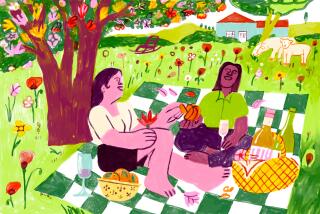Awards to Give in a Vintage Year : The Grapes of Wrath and the Grapes of Appreciation
- Share via
Overall, 1985 was an excellent year for the grape. Worldwide harvests were of better-than-average quality, with parts of California, Bordeaux and Burgundy calculated to be excellent. Consumers enjoyed low prices and wide, in-depth availability, whereas vintners struggled to attract wine lovers and new consumers.
It was also the year of the wine award when wineries believed each label required a gold medal accolade no matter the source. Here are my awards in the form of Sweet Grapes (cheers), Sour Grapes (jeers) and Sediment (awful).
Sweet Grapes--To consumers who are selecting, buying and enjoying the wines of the world for less than $10 and, often, less than $5, currently available in overabundant supply. Zeroing in on these wines rather than on big-name labels reflects growing consumer sophistication.
Alternative Labels
Sweet Grapes--To the many California vintners who are struggling to keep their prices at reasonable levels. Several are producing so-called alternative labels, like Phelps with Innisfree and Beringer with Napa Ridge. Both are expected to be priced at less than $10.
Sweet Grapes--To Christie’s of London for continuing to unearth antique bottles such as Chateau Lafite 1887, reputed to be from the cellar of Thomas Jefferson, and supported by evidence in the form of letters from Jefferson ordering the wine.
Sweet Grapes--To Continental Airlines for embarking on an in-flight wine seminar and tasting program of California and Australian wines.
Sweet Grapes--To Ernie Ball, Archie McClaren and Larry Shupnick of San Luis Obispo for undertaking and sponsoring the public television station KCBX’s 1985 wine auction. The trio virtually single-handedly hosted the event, which gains in stature each year.
Sweet Grapes--To Tawfiq Khoury of San Diego, who does the same yeoman work for public television station KPBS’s annual wine auction.
Sweet Grapes--To Moet and Chandon for continued research, including a new technology for yeast enclosure in Champagne’s Second Fermentation, which will more efficiently remove bottle cloudiness.
Sweet Grapes--To Mark Hopkins Inter-Continental Hotel in San Francisco for creating a wine list incorporating wines from every wine-producing state in America. The list includes wine from Alabama, Connecticut, Oklahoma, Minnesota, South Carolina and Wisconsin among others.
Sweet Grapes--To Champagne Deutz for the consistency of excellence in its non-vintage Brut, a wine that frequently challenges the vintaged.
Re-Released Red
Sweet Grapes--To Peter Mondavi of Charles Krug for his newly released 1974 Vintage Selection, Cabernet Sauvignon, Lot F-1. It is rare when a California winery re-releases a red with 10 years of age, especially from as fine a vintage as 1974.
Sweet Grapes--To Julia Child and Danny Kaye for their fund-raising efforts on behalf of the American Institute of Wine and Food.
Sediment--To France’s Burgundy and Champagne producers for their pricing tactics. Expect their wines to double in cost during 1986.
Sweet Grapes--To Pepsi-Cola through its Monsieur Henri Wines for importing wines from Bulgaria, rarities in these parts; a Cabernet Sauvignon 1978, Chardonnay 1983, and Blanc de Blanc 1983, all labeled Trakia. Although none are world beaters, they are worthy of a taste, especially the Cabernet at less than $6.
Sour Grapes--To the Sebastiani wine family for allowing family squabbles to surface.
Sweet Grapes--To Sebastianis, however, for nipping it in the bud and avoiding an imbroglio of long-term “Mondavian” proportions.
Sour Grapes--To California’s Wine Institute and Seagrams, the nation’s second-largest wine producer, for not settling the matter of the equivalency test ads. This is a wine versus spirits debate in which it is contended that equivalent amounts of wine and spirits cause equal amounts of intoxification. The dispute remains and the public is left confused.
Sweet Grapes--To the memory of Rudolph C. Kopf, the founder of Kobrand Corp., who died recently after a 50-year career in the importation of wine and spirits such as Louis Jadot Burgundy and Taittinger Champagne.
Sweet Grapes--To Parsons Creek Winery for successfully battling back after a serious fire destroyed almost all of its wine production. A new winery building is scheduled for the ’86 harvest.
Boon for Consumers
Sweet Grapes--To German wine writer, Mario Scheuermann, for spearheading a drive for a German Wine Classification not unlike claret’s 1855 “Grand Cru Classe.” If such a classification is accepted by the vintners, it could be a boon for consumers in the better understanding of German wine labels.
Sweet Grapes--To Monterey Vineyards for overall wine-line improvement, generally at $5 or less.
Sweet Grapes--To Roederer Champagne for calculated patience at its California Mendocino County Winery. The first sparkler is scheduled for release in 1988, even though it will be seven years from the time of acquisition to the time of release.
Sweet Grapes--To Paragon Vineyard Co. and its proprietor, J. R. Nivin, for pioneering the vineyards of Edna Valley in San Luis Obispo County. No fewer than 16 wineries obtain their grapes from Paragon, including such notables as Chalone, Sanford and Creston Manor.
Sweet Grapes--To Clarence Dillon, former secretary of the Treasury and owner of first-growth Chateau Haut Brion, on the occasion of the 50th anniversary of his purchase of the winery.
Wines of B.C. Highlighted
Sweet Grapes--To British Vancouver’s Pacific National Expedition for its 1985 wine judging, which highlighted the wines of British Columbia’s Okanagan Valley.
Sweet Grapes--To the California Legislature for a new vintage sale law. Under its terms, wine collectors, if in conformity, may be able to sell from their own cellars a red wine not less than 10 years old and/or white, rose and sparkling not less than five years old, provided that labels state they are from a private collection. Check with local offices of the Department of Beverage Control for further information.
Sour Grapes--To America’s restaurateurs who overcharge for the privilege of bringing your own wine. Some determine corkage fees by a bottle’s value, conveniently forgetting that it takes as much effort to uncork inexpensive bottles as expensive bottles.


